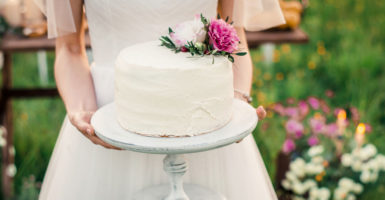The Supreme Court is gearing up to hear one of the most important cases of the 2017 term.
In Masterpiece Cakeshop v. Colorado Civil Rights Commission, the court will consider whether the state of Colorado may compel cake artist Jack Phillips to create custom wedding cakes for same-sex weddings in violation of his religious beliefs.
The court’s decision in this case won’t just affect Phillips. It will affect other artists who may want to decline to use their creative talents on projects that violate their own consciences.
To highlight just how broadly this decision will be felt, 11 cake artists and 479 other creative professionals filed amicus briefs at the Supreme Court. Here’s what these groups said in the briefs.
Cake Artists
The 11 cake artists who came together for this amicus brief note that cake design is a form of art. They explained to the court that they “create images of beauty that evoke ideas and emotions in deliciously edible form.” And if you don’t believe them, they included plenty of pictures in the brief.
While these artists did not write for or against any party in their brief, they explain that the creative process involved in making cakes is just as intricate and expressive as songwriting, painting, or web design.
Cake artists must use visual-art skills such as painting, drawing, and sculpting, and they must be able to create a unified whole from a series of individual artistic elements, such as textures, photographs, three-dimensional objects, and color.
In fact, custom cake design is so artistic that artists’ designs can be protected under federal intellectual property law. As the brief points out, the Library of Congress has thousands of custom cake designs in its copyright record.
The cake artists also explain why wedding cakes are unique and are often “the most iconic examples of the artists’ craft.” Unlike birthday cakes or “get well soon” cakes, wedding cakes often incorporate elements that reflect the couple’s personality.
These cakes are often themed, matching the pattern of the invitations or the couple’s fine china. Or they can feature hand-drawn characters from “Alice in Wonderland,” paying tribute to the bride’s favorite childhood story.
Wedding cakes can also reflect the ethnic heritage of the couple, incorporating colors and shapes from a shared cultural background.
The cake artists also point out that same-sex wedding cakes “can be especially artistic.” They often utilize rainbows both on the exterior and interior of a cake, and the cake artists have “found that cakes for same-sex weddings are frequently far more open to displays of personality and vivid expression, allowing the cake artist a decidedly freer hand in creation.”
The cake artists emphasize that they “merit as much protection for their expressive work as artists using other mediums,” and they note that the court’s existing free speech framework already includes symbolic nonverbal expression.
In two famous cases, Texas v. Johnson (which recognized burning of the American flag as expressive conduct) and West Virginia Board of Education v. Barnette (which recognized the right not to salute the American flag), the court recognized that the First Amendment protects symbolic expression, not just verbal or written communication.
Wedding cakes, these artists say, should qualify, too.
Other Creative Professionals
In another amicus brief specifically supporting Phillips, 479 creative professionals from all 50 states, D.C., and Puerto Rico highlight their concern that a ruling against Phillips will threaten their expressive freedom in the workplace.
These cake designers, musicians, florists, photographers, journalists, videographers, poets, songwriters, calligraphers, graphic designers, cartoonists, bloggers, website designers, authors, actors, writers, sculptors, and painters have differing views on gay marriage. But they come together here for one purpose: “They do not want the state forcing them to convey objectionable messages through their art.”
They tell the stories of creative professionals in the wedding industry—other cake-makers, filmmakers, custom website designers, creators of printing and marketing material, and photographers—who “face crippling fines, loss of business, government re-education, and even jail time” for declining to participate in a same-sex wedding.
They highlight this dangerous trend in state court and urge the Supreme Court to reverse course and protect each of their rights to “create freely.”
“It is difficult to imagine,” they write, “a more onerous and effectual compulsion to speak.”
Finally, the creative professionals propose that while this case is limited to the same-sex wedding context, “creative professionals of all stripes stand to suffer from undue compulsion” in other areas, should the court rule against Phillips.
They ask:
Should an African-American supporter of ‘Black Lives Matter’ be required to make and design a cake for white nationalist function? Must a graphic designer who supports gun control create advocacy literature for the National Rifle Association? Is an atheist photographer obliged to take and publish pictures of a Christian baptism?
These creative professionals believe that under the First Amendment, the answer clearly is no. They hope the government will not compel them or anyone else “to utter messages—through art of their own making—that betrays their values, wills, and consciences, as well as their tongues.”




























